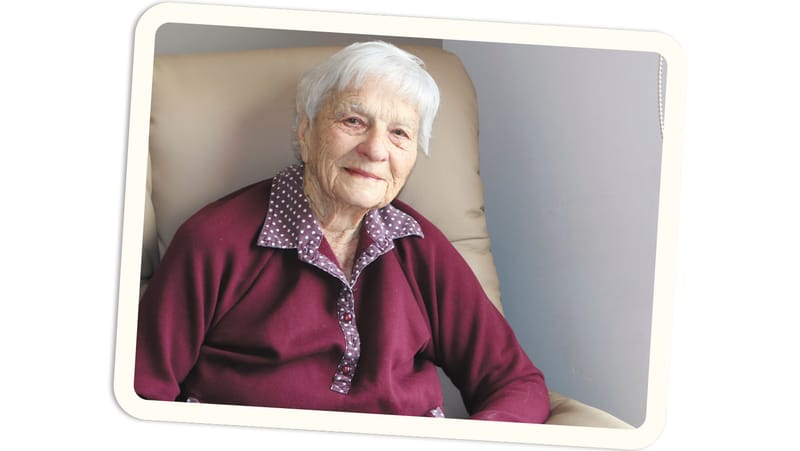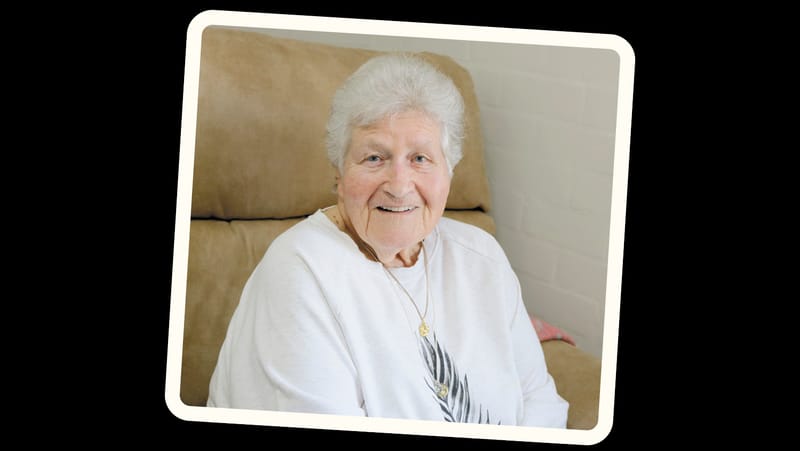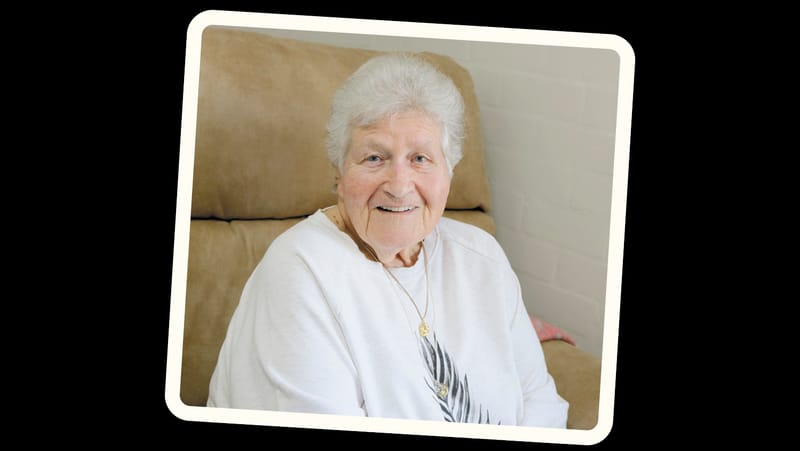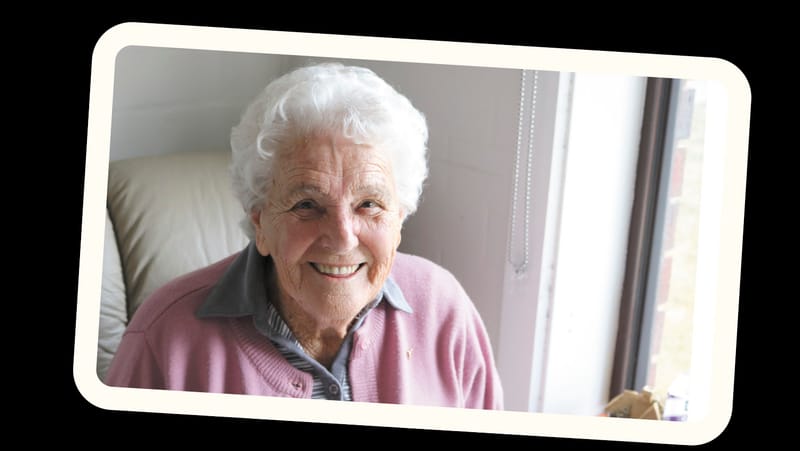A Chat With... Lewis Gray
Originally Published August 15, 2013.
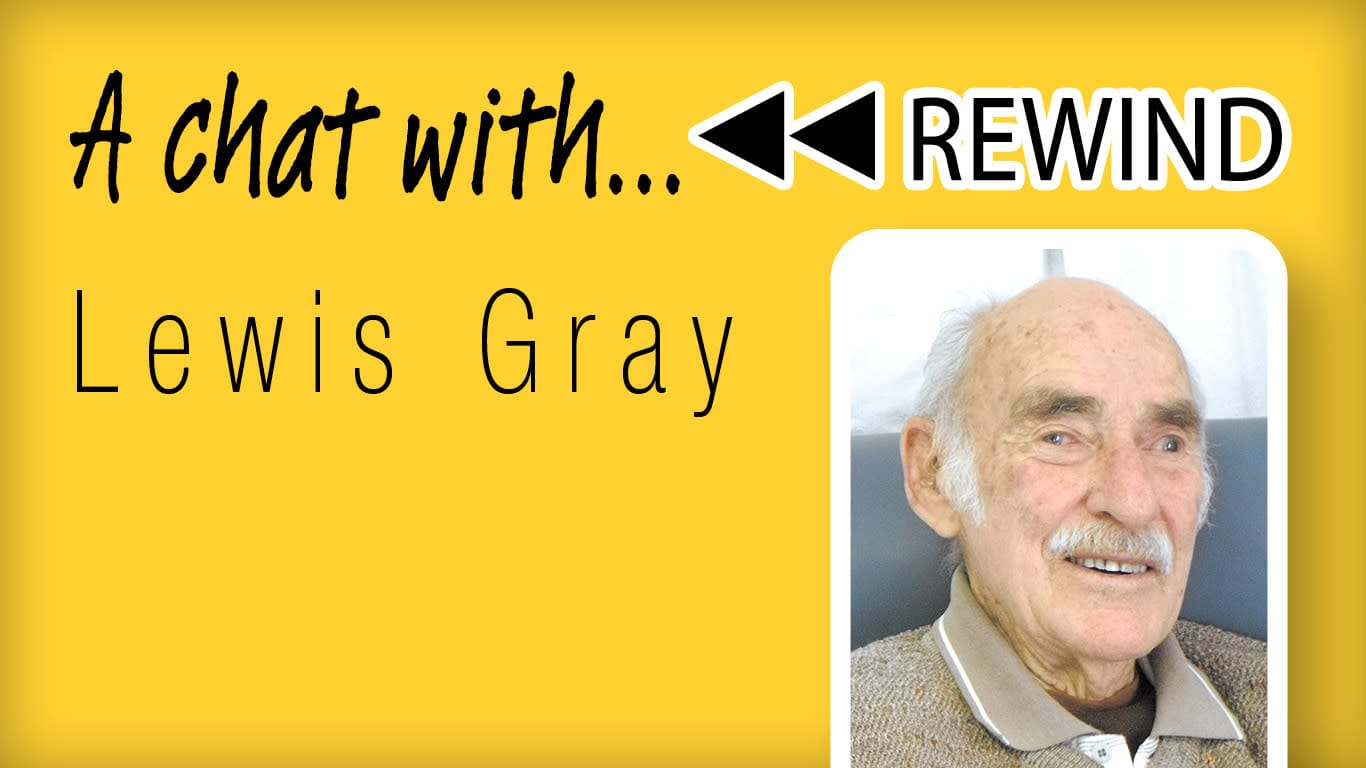
Published August 15, 2013.
My job is a privilege; speaking to people about their lives, sharing their memories, reliving history - a realisation that really hit home when Lew Gray closed our chat with a wink, a smile and the words, “I’ve had a good life; I’ll be sad when it ends.” We shook hands and this amazing man left the room....but let’s back it up 86 years.
Lewis (Lew) Milton Gray was born on January 2, 1927, in Narrogin, West Australia, “Which was about fifty miles away from home,” he said, “or about a four hour trip in a T-model Ford. There was one sand dune so steep, that you had to go up it in reverse. Narrogin is about halfway between Albany and Perth.”
“My father, William, was a World War One veteran who took up land in the area when it was being broken up for settlement; my mother, Mabel, was a local school teacher. They had sheep and tried (against the odds) to grow crops.
“I was the youngest of three children. My brother, Alan was four, and a half years my senior. My sister, Dulcie was seven when I was born,” Lewis then added that his father was gassed whilst serving in Europe, and as such, regularly ran short of breath. He [Lewis’ father] was one of seven sons, and the only one to return.
“Our house was a humpy by today’s standards I suppose, set in amongst the sand – made out of squashed kerosene cans and hessian bags. Life was really basic, but we knew no other way. We didn’t know we were deprived,” he laughed, “our parents were wonderful, strong people and that was the basis of a marvellous upbringing.
“Our toilet was no more than a pan a hundred metres from the house, an area frequented regularly by a friendly carpet snake which liked a pat. There was a well, thirty or forty yards away, which is why my parents built there of course. There was underground water everywhere in that area, running in furrows across limestone shelves under the sand,” he said before adding, “the Aboriginal people showed us how to find it, told us where to dig.”
Lew’s upbringing was different from most other ‘white’ children, “ I was raised amongst Aboriginal people, we were the only white family for miles. All my friends were Aboriginal, my parents and the tribal elders were best friends, I had dozens of self-appointed aunties and uncles... And you couldn’t ask for better people, they were beautiful; so caring, so much fun to be around.”
For entertainment, Lew played football, football and more football, “No one had boots so we all just kicked the ball in bare feet, which was actually the way the Aboriginal children preferred it... And they were magnificent footballers; I distinctly recall three brothers who were in their twenties when I was about six. They played for Dudinin (the closest railway siding and football side) and when they got the ball in a match they just ran. Barely anyone could get near them. There was an old Irishman that was quite a fanatical supporter who came to the games. He constantly ran up and down the boundary screaming ‘kick it, kick it’ at them. The brothers adopted his catch cry as their maiden name,” he smiled.
“The Aboriginal kids hated cricket, it bored them to tears,” Lew said with a grin, “but my brother and I, loved it so they would throw the ball to us just to be nice... And they loved running races; the closest I ever got behind the slowest of them was fifty yards in a 74-metre dash.
“We went roo shooting every now and again, but it was only myself and my brother that handled the guns. Our mates just came along for some fun and some meat.”
“As I said, my mother was a school teacher so I could read and write by the time I was four. She was very particular about her children getting a good education,” he said, “before she married my father, she taught at a school called Gate 86. We all attended school at Gate 89,” he said.
Lew then explained that the schools were named after the gate in the fence they sat alongside, each nine miles apart.
“Our school was on the West Australian ‘Rabbit-Proof Fence’ as they called it; three miles from home. They were basic little timber buildings and wouldn’t have stayed open if not for the aboriginal children that attended them. In my school was my brother, sister, myself and five Aboriginal kids. My best friends were called Reggie, Fraser and Gertie.”
Apart from his friendships, Lew didn’t remember much about school at Gate 89, “That being said, I do recall my weekly chore of emptying the school toilet pan – there was nearly always a dead snake in the bottom.”
At age 11, Lew sat an examination and was awarded a scholarship to go to high school, “It was the ‘James Coomb’ Scholarship. Only two were awarded in the state,” he said very humbly, “There were only six high schools in Western Australia at that stage. I went to boarding school in Albany,” – and that was where Lew’s life in the sand dunes ended.
“My father passed away at age 47 when I was thirteen. His lungs eventually collapsed due to being gassed in the war and his heart gave out – my mother left the farm and moved to Perth. My sister and brother had left home years before,” he said before adding, “my sister’s husband served in New Guinea during the war, and went on to become its last administrator prior to it being granted its independence in the seventies.”
We jumped back to Lew’s school years, “I loved boarding school, but I was not really there long enough. As I was ahead of the other kids a bit, due to my mother’s hard work, I did five years of schooling in three – my fondest memories are of chasing girls, raiding orchards and playing sport. I was hopeless at football, pretty good at cricket and handy at tennis,” he then laughed, “and myself and two mates used to hide up in the roof of the classrooms to have a smoke – and butt ash over the teachers heads through the ventilators.”
He had wanted to go to University when he finished school, but that was before his life turned upside down, “The Japs bombed Pearl Harbour the same day I was sitting my final exam, December 7, 1941,” he said, “As far as I could gather they were heading south and no one was stopping them – I thought I would go and sort them out,” he grinned, “boyish bravado I guess.”
“My brother was already in the Air Force, but I loved the ocean and decided that I wanted to join the Navy – so at the age of fifteen, I went home, lied to my mother that I had won a scholarship to Naval College, shoved my brother’s birth certificate in my bag and headed to Perth to join up. I enlisted in the Navy and my name became Alan Gray. Undoubtedly, I probably looked too young but no one asked questions – I had a birth certificate after all,” he said.
He caught the train from Perth to Flinders in Victoria, was issued with a uniform and began training, “It was just sheer boredom; drills, marching and little else. We just went around in circles all day until you were too tired to do any else,” he said before I asked ‘What about when all the older men went out for a beer?’, to which he responded with a smile “I went too of course – and the best thing was that most of the time civilians bought the beers for you.” Lew then expanded on peoples’ generosity during the war.
“It’s not often mentioned, but the way people treated everyone in uniform was outstanding. When we went on leave, couples and families would be lining the rail platform waiting to take servicemen in; no questions asked. They fed you, gave you a bed, treated us well. The country really pulled together during the hardship of the war. I regularly stayed with one family that I grew very fond of – I went back to visit them in the fifties to thank them (again) for all they did for me.”
Lew then said he made the worst mistake of his life, “The Navy was looking for volunteers and I put my hand up – first rule of the military ‘never volunteer’,” he said, “from then on my life was never the same.”
He then explained how he was sent to special training in thick bushland (jungle) near Canungra, “We were taught to move through the jungle, like shadows, how to kill very effectively and quietly,” he said with a sombre tone in his voice, “and we were basically brainwashed to think a certain way. We grew to believe that the Japanese were the lowest form of vermin on the planet,” Lew added, “...it was all quite exciting for a young lad, I thought it was an adventure. I was young, strong and ready to do my bit. In the end, I was left with naught but nightmares and regret.”
He was passed out as a ‘Naval Beach Commando’ and shipped off to Darwin where, under the instruction of an American Colonel and Naval Commander of Intelligence, he was given a crash course in Japanese aircraft, ships and insignia recognition. “We trained in kayaks constantly, fine weather or foul...the worst thing being the seas wasps (jelly fish),” he said before telling me a story I found quite amazing.
“I couldn’t swim you know, I had no need to in Narrogin. They tried and tried for weeks to teach me whilst in training, and I could do every stroke like a professional until I went into the water, then I sank. In the end, they just said that I was one of the lucky ones and let me go; ‘lucky’ meaning that if ever I was on a boat that was hit I would die quickly rather than paddle around and drown slowly,” he laughed.
Of the 66 men who volunteered for the ‘Naval Beach Commandos’ only 38 completed the training; young Lew was one of them.
“I was still only sixteen,” he said, “and my first three missions were on islands around Java. I was dropped off by myself in a kayak by an American submarine...,” I jumped in and asked ‘Weren’t you scared, you couldn’t swim?’....., “Yes, I guess I was scared but not about not being able to swim – the kayaks were fitted with flotation devices and I was strapped in; and if you were sighted in the water you were a goner anyway. It didn’t make any difference,” he answered.
“My job was to get ashore and as close as possible to Japanese camps and within sight of their ports – reporting back via radio on their movements, numbers, strong-points. Each mission was a month-long; I was dropped off when there was no moon and picked up when it came around again.”
“I survived on dry rations and an abundance of jungle fruit; bananas, plantains and such. I lay low and observed,” he said before adding quietly, “I had to use my hand to hand combat training on a few occasions and really I don’t want to talk about it. I saw atrocities that cemented my poor impression of the Japanese, I witnessed the torture of men and women; very rarely being able to help. They cut off women’s breasts, sliced off peoples toes – just for fun,” Lew was becoming quite emotional but carried on, “I once saw three Japanese soldiers torturing a pig, and I have always liked pigs,” he said, “they had it hung by its back legs, it was in pain and they were enjoying it. I saw red and did what I felt I had to – I have to live with my actions; I tell myself the mongrels deserved it.”
During his third drop off in Java, Lew contracted malaria, “I got it just before the pick-up and was so sick that I missed the sub; I was left behind. My radio was taken by Javanese villagers who thankfully didn’t hand me over to the Japanese, my rations ran out. I lay low for two more weeks, getting weaker all the time until I saw my opportunity to steal a Japanese launch and sixteen gallons of fuel. I headed off, thinking I may make it to Australia I suppose,” he smiled, “but I ran out of fuel somewhere in the middle of the Arafura Sea – luckily the boat had a decent radio on it and I was finally able to get through to the base. A Catalina picked me up soon after and I was taken home.”
I sat back in my chair, amazed at what Lew had been through, before he added a little more to the story, “and then on Anzac Day in Barham, sometime in the 1990s, I noticed a man staring at me. He continued looking at me for some time before walking up and asking, ‘Were you ever picked up in the Arafura Sea?’ I nodded and he informed me that he had been the pilot all those years ago.”
On his return, Lew continued training, yet his malaria became more and more of a problem.
“... and it was whilst suffering through one of these bouts that my secret was discovered. I was ranting with fever and they caught on that I wasn’t as old as I said I was, nor was my name Alan.”
Lew was promptly discharged and sent home – three months later he joined up again, “but this time I didn’t make the mistake of volunteering for anything,” he said with a grin, “I simply got through the training and became a Naval Seaman based in Darwin aboard a little vessel called the ‘Kookaburra’ - and shortly after that, the war ended; the fun times began.”
Lew then mentioned an incident that was quite an issue at the time, “I was struck down with malaria again two weeks after being drafted to Darwin – this threw doctors and authorities into a mild panic because as far as they were aware I had never been out of the country. They thought that there must be areas where the Anopheles mosquito was still breeding,” he smiled.
“I was quartermaster aboard a vessel called the ‘Kangaroo’ and it was time for it to be taken to Sydney and be paid off (sat in the dock). We made it around to Thursday Island only to find that the pub had no beer and we had to drink spirits. Myself and the skipper were a mess and regardless of our best efforts we weren’t able to leave until three the next afternoon,” he laughed, “and when we stopped off in Cairns we came across a white cockatoo that loved beer. He would call you a ‘bloody bastard’ if you took his glass away from him; and I remember pulling into Townsville only to meet a tanker coming out the other way. It was a one-way port and amidst a mouthful of abuse from both skippers I managed to steer through with about three feet to spare – although I think we shaved a few barnacles off the side pylons,” he laughed.
After arriving in Sydney, Lew went on leave and met up with his mother, brother and sister in Perth.
“My brother had made it back from the war as well. He had been flying Liberators out of Morotai; my sister was married and my mother had forgiven me,” he said, “all was good – so I headed off again.”
Lew was drafted to a naval vessel called the ‘Karangi’ in Freemantle and stayed there for twelve months, having a lot of fun with a bloke by the name of ‘Tubby’ Burns along the way, “Tubby was six foot tall and about ten foot round,” smiled Lew, “and we did a lot of drinking together. One night after we had enjoyed one or more too many, Tubby, myself and a fellow by the name of Peter Moore, heard a distress call come out over the radio. Realising that a rescue ship was probably a long way off for the poor beggars we thought we would help them ourselves. We went to the depot, took ourselves a cutter and headed out to sea. We found ourselves in rough seas and had to bail vigorously to stay afloat, then (still three parts full) we saw the fishing lugger in trouble. We threw a line to it and proceeded to try and tow it in,” he said, “which we were only able to do at about half a knot, a cutter towing a lugger was pretty stupid after all,” said Lew, “then the real rescue boat arrived but Tubby told it to bugger off – he was never one for authority and especially so after a few drinks. We eventually got it to dock and were promptly arrested for stealing the cutter and all sorts of other things I guess. We got 28 days stoppage of leave and pay and given the chance to reply – Tubby said he’d do it again if the circumstance arose, he was given another 14 days,” he laughed.
Lew was discharged in 1947 and thought he may try school teaching, “I went to teachers’ college and then did twelve months at a Primary School before deciding it wasn’t for me – I got a job as an SP bookmaker in Rockingham instead,” he laughed, “it was all quite illegal, but my boss got on well with the police so I was left alone. I had two happy years there before the wanderlust got me.” He then told me another story that took place during this period.
“I’d had a few drinks with Keith Miller, an Australian cricket allrounder, and he put in a good word for me to play for West Australia against the ‘Invincibles’ (Australian Cricket side) who were touring at the time. We were told we weren’t allowed to get Bradman out before he got his hundred – not that we could have anyway. We got well and truly beaten; I think I only scored about fifteen runs.”
Lew wanted to go places, see things, “I worked on a winery in Adelaide for a while before going to Melbourne and taking a job at Heinz for three years,” he said, “and it was whilst at Heinz that I met Joy (Newman). We were married in Hawthorn on March 20, 1954.” Lew and Joy are still married today.
“Heinz closed their factory in Richmond soon after and reopened in Dandenong – we lived in Hawthorn so getting there was a bit of a bother. I got a job with shipping company R.W. Miller instead. My job was to liaise between the Waterside Workers Union and the Seamans Union; two of the worst unions you couldn’t wish for. It led to some pretty interesting times,” he grinned before adding, “I once caused a strike and a little antagonism by merely suggesting that a particular gang of fellows, who were extremely quick at unloading coal, should just work for us – the Waterside Workers Union soon put a stop to that.” During this time Lew and Joy had moved from Hawthorn and bought their own home in Mitcham.
Lew remained at R.W. Miller for four years before going to ‘Dural Leeds’, a blind manufacturer owned by four brothers, “and four nicer fellows you wouldn’t meet in a long days march,” said Lew.
“I was on clover really,” he said, “I was getting paid twenty seven pound ten a week, damn good money then.”
It was whilst at ‘Dural Leeds’ that Lew acquired a name for himself as quite the inventor, “I could see the need for a universal mounting bracket for blinds so I drew up a design for one – the company ended up manufacturing more than 750,000 of these brackets per year and went international. I then designed spring rollers out of steel (instead of the imported wooden ones) and they too developed into a massive manufacturing project,” Lew said, obviously proud of these achievements.
The company was then taken over by ‘Hunter Douglas’ and Lew was given the job of making roller blind cloth, “I knew nothing about cloth or chemistry but had a go – it took me about six months to develop a suitable cloth for their needs.” His position with the company then led to a transfer to Sydney, “I had a good job as Product Manager and enjoyed it immensely. Joy and I lived in North Ryde – and our time in Sydney was one big party really; good friends and great times.”
Lew retired in 1979 and started living off the races, “I would bet until I had won a hundred dollars or so and then go home. I found it an easy way to make a living,” he joked.
Lew and Joy had been travelling down to Koondrook for a holiday for years and eventually thought they would make it more permanent, “My best man, Harold Marshall, lived here already and I knew several others so it was an easy decision... We purchased our house on Grigg Road in 1984. We have had a nice quiet time here, the most exciting thing being when we won the $58,000 jackpot at the club in the late 1990s,” he said, “and I began playing bowls in the seventies so fell into it here as well. I played at Barham Services for ten years before drifting across to Sports and playing there for another fifteen. I was even appointed coach for a while – a role that I feel I was singularly unsuccessful at,” he grinned. Lew played bowls until two years ago when he lost the sight in his left eye, “This made it nearly impossible to judge distance,” he said.
We both took a sip of our coffee and Lew looked at the clock, judging that our time was up... And as he walked out the door smiling, obviously more than content with his lot, I couldn’t help but take a deep breath and think to myself, ‘What a fascinating life’.
Thanks for the chat Lew



